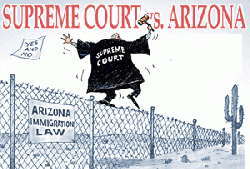WASHINGTON — In a long-awaited decision with potential electoral consequences, the U.S. Supreme Court Monday struck down three out of four provisions of a controversial Arizona law aimed against undocumented immigrants.
A five-to-three majority of the court ruled that those provisions, including one making it a crime for undocumented immigrants to seek work, went beyond existing federal immigration law. It has been a long-established principle in U.S. constitutional law that federal law “pre-empts” state law if they conflict.
But the court unanimously upheld the law’s single-most controversial provision – sometimes referred to as the “show-me-your-papers” law – that would require local police under certain conditions to check on a person’s immigration status if they have been detained or arrested in connection with the violation or enforcement of other laws.
Reacting to the decision, President Barack Obama, whose Justice Department challenged the Arizona law soon after its enactment in 2010, said he was “pleased” with the Court’s decision to strike down those provisions that conflicted with federal immigration law.
“At the same time,” he added, “I remain concerned about the practical impact of the remaining provision of the Arizona law that requires local law enforcement officials to check the immigration status of anyone they even suspect to be here illegally.
“Going forward, we must ensure that Arizona law enforcement officials do not enforce this law in a manner that undermines the civil rights of Americas…,” he went on, adding that the court’s ruling showed the need for Congress to enact “comprehensive immigration reform.”
A number of civil rights groups also reacted negatively to the court’s decision to let the “papers” provision stand, suggesting that they will soon be filing their own lawsuits against the measure once Arizona begins enforcing it.
“By re-instating the ‘show-me-your-papers’ for now, the court has left the door open to racial profiling and illegal detentions in Arizona,” said Anthony Romero, executive director of the American Civil Liberties Union (ACLU). “We have amassed an 8.77 million dollar war chest to fight those battles in court and to counter any and every anti-immigrant copycat measure in other states.”
“The xenophobic virus in Arizona must be contained before it spreads to other states,” he added.
But Arizona Republican Gov. Jan Brewer, who claimed that the “heart of the law” had been upheld by the court, insisted that “racial profiling will not be tolerated” by her administration.
The court’s ruling comes at a critical moment in the 2012 election campaign and could influence its outcome, particularly in so-called swing states with large Hispanic populations, including Arizona and several of its Rocky Mountain neighbours, as well as Florida, North Carolina, and Virginia.
Despite a significant reduction in Latino immigration since the 2008 financial crisis, the overall U.S. Latino population has increased by more than 40 percent over the past decade – to more than 50 million. Much of that growth has been concentrated in the Rocky Mountain states, Texas and the southeast.
Obama won about two-thirds of the Latino vote nationwide in 2008 and hopes to equal or surpass that percentage in November.
In a move that drew enthusiastic support from many Latinos, Obama announced earlier this month that his administration will stop deporting undocumented immigrants under the age of 30 who entered the U.S. as children, have no criminal records, and have either served in the U.S. armed forces or graduated from a high school or the equivalent.
Approximately 800,000 people – the vast majority Latino – are expected to benefit from the action.
With just a few exceptions, Republicans – including their presumptive presidential candidate, former Massachusetts Gov. Mitt Romney – have come out against Obama’s action, as they have against any measure that they construe as granting “amnesty” to any of the estimated 12 million undocumented immigrants living in the U.S.
For the most part, they have also rallied behind the Arizona law and similar or even more severe “copycat” laws enacted over the past two years by legislatures in Alabama, Georgia, South Carolina, and several other states. During the primary campaign, Romney endorsed the Arizona law, although Florida Senator Marco Rubio, touted as a possible vice-presidential running-mate, has denounced it.”
I believe that each state has the duty – and the right – to secure our borders and preserve the rule of law, particularly when the federal government has failed to meet its responsibilities,” Romney said Monday in a statement that charged Obama with having “fail(ed) to provide any leadership on immigration.”
Romney’s political problems in reacting to the ruling were noted by Michael Shear of The Caucus blog of the New York Times. “More specific expressions of support for the law’s controversial provisions would be likely to undermine his efforts to increase support among Latinos. But if Mr. Romney distances himself from the Arizona law, he runs the risk of alienating conservative Tea Party supporters who back aggressive enforcement.”
The three provisions of the law that were found to unconstitutionally undermine federal law included criminalizing undocumented immigrants who fail to register as such under a federal law or who work or try to find work in the state, and a third that authorized police to arrest people if they have probable cause to believe they had committed crimes that would make them deportable under federal law.
The Justice Department took the position that the fourth provision – the “show me your papers” provision – also went beyond federal law, a position also taken by the appeals court which heard the case before Arizona appealed it to the Supreme Court.
But the justices disagreed, although they also noted that much would depend on how the law was implemented. “This opinion does not foreclose other pre-emption and constitutional challenges to the law as interpreted and applied after it goes into effect,” Kennedy wrote for the majority.
He also stressed that “detaining individuals solely to verify their immigration status would raise constitutional concerns.”
Indeed, a number of Latino and other civil society groups stressed that they intended both to closely scrutinise Arizona’s application of the law and file suits on other grounds against its enforcement.
”The Supreme Court …failed to decisively remove the bull’s eye on the backs of Arizona’s Latinos, leaving it to future lawsuits to address,” declared the National Council of La Raza. “Those challenges will come, because this provision legitimizes racial profiling and should not be allowed to stand in Arizona or anywhere else.”
“Knowing as we know, that the intention behind the anti-immigrant Arizona law is to see the largest number of people possible be ejected from the U.S., we find the U.S. Supreme Court decision as a dangerous sanctioning of what could become a witch hunt against foreign-born populations,” noted Angela Sanbrano, president of the National Alliance of Latin American and Caribbean Communities (NALACC).
“Now more than ever, it will be crucial to closely scrutinize the action by local law enforcement agencies in Arizona.”
New York-based Human Rights Watch (HRW) also expressed dismay with the ruling and scepticism over Brewer’s assurances that the law will not result in racial profiling.
“The Supreme Court ruling opens the door to anti-immigrant abuses we’ve seen in other states with similar laws,” said Grace Meng, an HRW researcher. “The court said it was too soon to know what harm there might be from this one provision, but the harm from a similar provision in Alabama is all too clear.”
– IPS






Leave a Reply